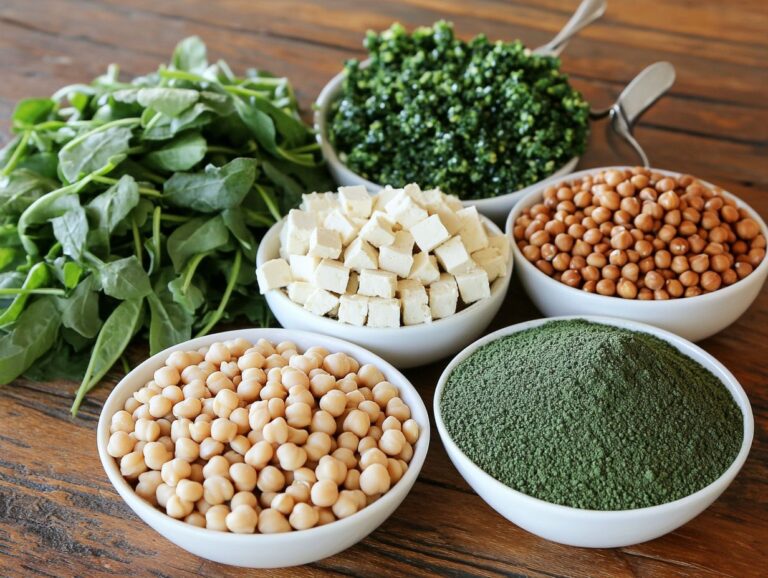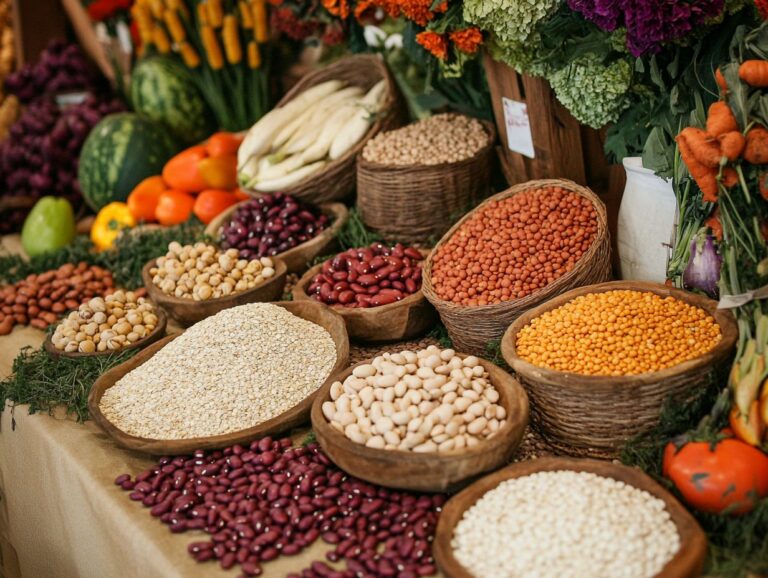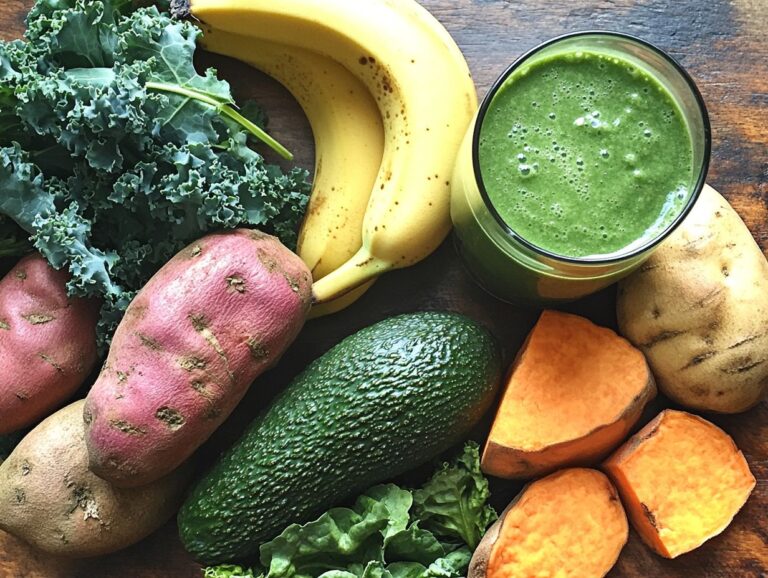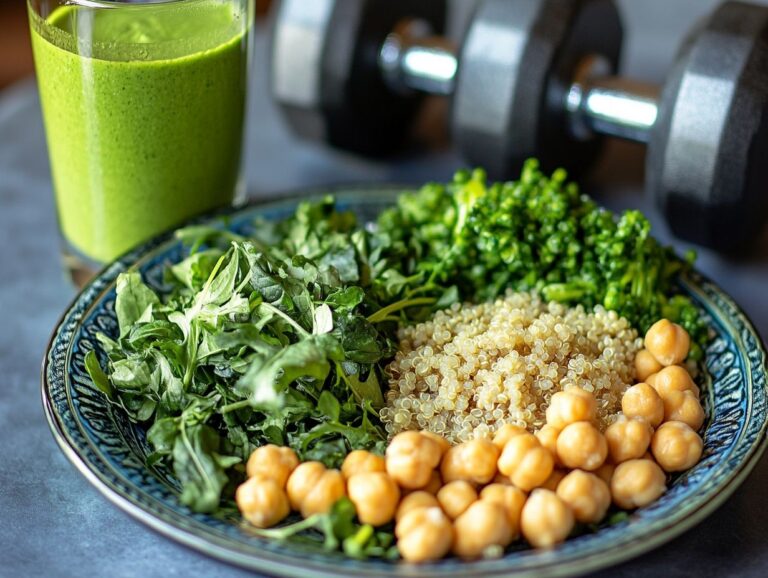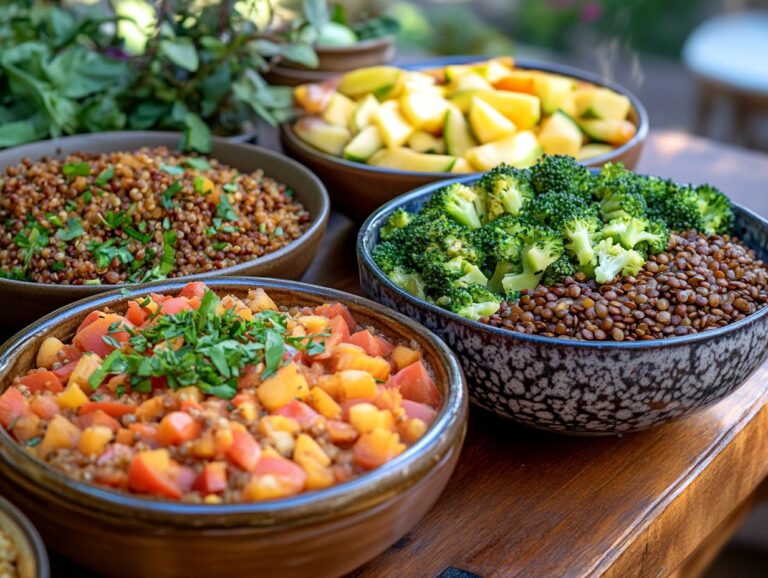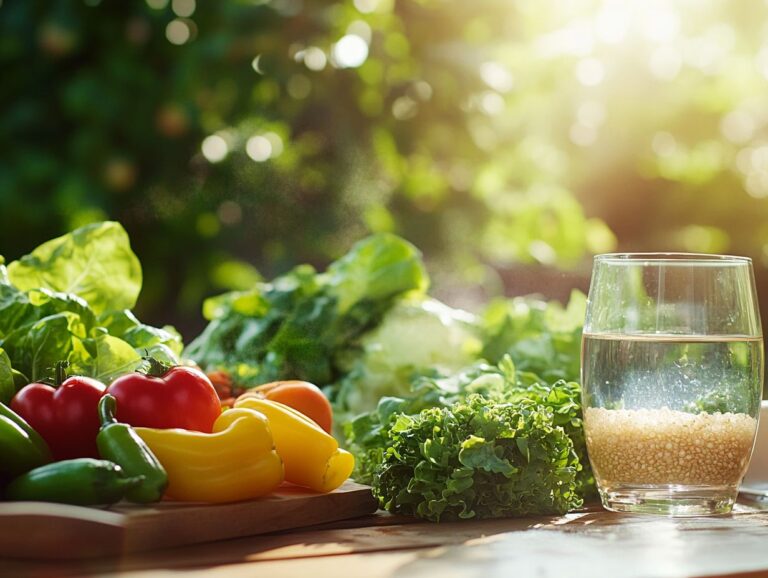If you’re seeking a vegan bodybuilding diet plan, you’re not alone. An increasing number of athletes and fitness enthusiasts are discovering that plant-based nutrition can effectively support muscle-building goals while enhancing overall health. This article explores what a vegan bodybuilding diet entails, highlights its numerous health benefits—including a lower risk of chronic disease risks such as heart disease and cancer, and reduced environmental impact—and offers useful tips for successfully building muscle on a vegan diet, including vegan meal plan, meal planning guidelines, and protein-rich foods.
Key Takeaways:
- A vegan bodybuilding diet plan helps reduce the risk of chronic disease risks, such as heart disease and cancer, and has a lower environmental impact.
- Adequate caloric needs and protein requirements, incorporating plant-based protein sources, and eating a variety of whole foods are key to muscle building on a vegan bodybuilding diet plan.
- Success on a vegan bodybuilding diet plan requires meal planning, staying hydrated, listening to your body, and finding support and community, such as through the International Society of Sports Nutrition.
What Is a Vegan Bodybuilding Diet Plan?
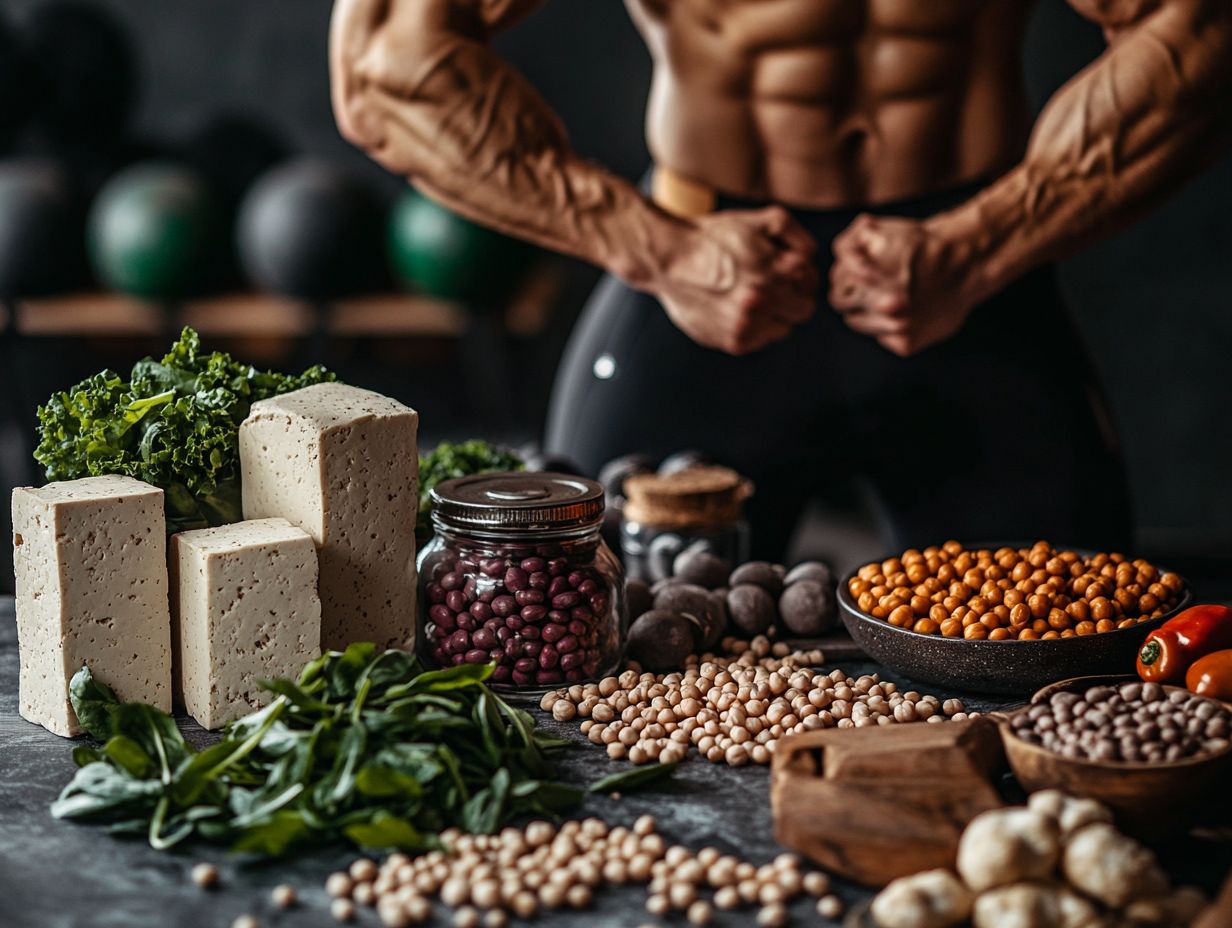
A vegan bodybuilding diet plan is a structured nutritional approach tailored for individuals who follow a vegan lifestyle and seek to build lean muscle mass.
This diet emphasizes the incorporation of a variety of plant-based protein sources to ensure adequate intake of essential nutrients necessary for muscle growth and repair, while addressing nutrient deficiencies common in vegan diets.
It highlights the importance of consuming protein-rich foods such as legumes, nuts, seeds, and whole grains, while also addressing the specific caloric needs and protein requirements of vegan athletes, such as vegan bodybuilders.
What Are the Benefits of a Vegan Bodybuilding Diet Plan?
A vegan bodybuilding diet plan offers numerous health benefits beyond muscle building, including a reduced risk of chronic diseases such as heart disease and cancer.
Vegan bodybuilders often adopt a plant-based diet that prioritizes nutrient density to enhance their overall health while also supporting muscle growth.
Research published in journals such as the Journal of the International Society of Sports Nutrition and the Journal of General Internal Medicine has demonstrated that higher intakes of fruits, vegetables, whole grains, and legumes can provide essential nutrients while eliminating harmful substances like processed meats. This approach promotes longevity and well-being among vegan athletes.
1. Lower Risk of Chronic Diseases
A vegan bodybuilding diet can significantly reduce the risk of chronic diseases, particularly heart disease and certain cancers. This is primarily due to the absence of processed meats and the emphasis on whole plant foods, which are rich in antioxidants, fiber, and other essential nutrients that help reduce inflammation and promote optimal health.
A well-planned vegan diet can supply healthy nutrients traditionally obtained from meat, such as omega-3 fatty acids, which are found in flaxseeds and walnuts. Research indicates that individuals following this dietary pattern experience a 30% reduction in the risk of heart disease.
While Vitamin B12 is typically not present in most vegan diets, fortified sources can provide it, along with iron from lentils and chickpeas, contributing to long-term health benefits. A study published in the Journal of Nutrition highlights that those adhering to a vegan diet are less likely to develop chronic diseases, showcasing the protective benefits of the nutrients it offers.
2. Higher Nutrient Density
One of the key benefits of a vegan bodybuilding diet is its increased nutrient density, which refers to a higher amount of nutrients available per calorie consumed. By focusing on whole foods such as lentils, quinoa, and leafy greens, vegan bodybuilders can meet their protein needs without excessive calorie intake and avoid the nutrient deficiency syndromes often associated with other restrictive diets.
These nutrient-dense foods promote muscle repair and overall health, enabling individuals to engage in high-intensity training while ensuring adequate intake of essential nutrients like zinc, calcium, and vitamin D. For instance, beans are an excellent source of protein and are also one of the best sources of zinc, which is vital for muscle recovery.
Additionally, fortified plant-based milks can enhance calcium and vitamin D intake, both of which are crucial for muscle function and bone development. Foods such as tempeh, almonds, and leafy greens contribute to a balanced diet that supports muscle growth, lean muscle mass, and the overall functioning of the physiological system.
3. Lower Environmental Impact
A vegan bodybuilding diet positively impacts the environment by promoting sustainable food choices that combat climate change. By eliminating animal products, vegan diets significantly reduce the greenhouse gas emissions associated with livestock farming and encourage more efficient land use.
This dietary shift aligns with global sustainability efforts aimed at protecting the planet’s limited resources. Plant-based proteins and superfoods require substantially less water and land compared to animal proteins, resulting in reduced deforestation and habitat destruction.
Embracing a vegan lifestyle fosters ecological responsibility, urging individuals to consider the broader impact of their choices on the environment. As more people adopt plant-based diets, the collective demand for sustainable agricultural practices increases, contributing to a healthier ecosystem and promoting biodiversity.
Such collective action is crucial for ensuring food security and maintaining the delicate balance of our planet’s resources.
How to Build Muscle on a Vegan Bodybuilding Diet Plan
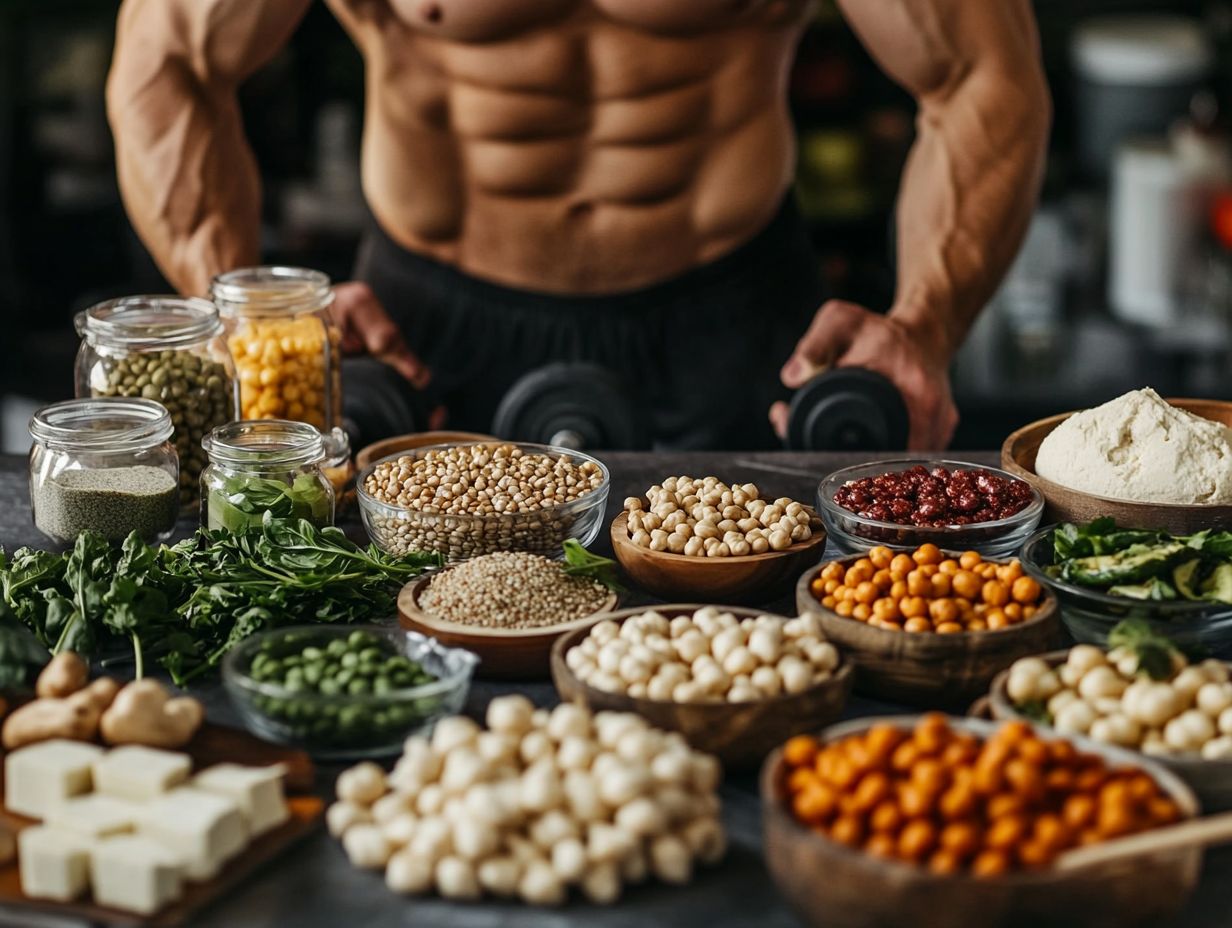
Building muscle on a vegan bodybuilding diet plan involves ensuring adequate caloric and protein intake, along with engaging in effective muscle-building workouts.
Vegan athletes must understand their protein requirements and make certain they consume enough plant-based protein sources that provide all the essential amino acids necessary for muscle repair and growth.
1. Consume Adequate Calories and Protein
To effectively build muscle, it is essential for vegan bodybuilders to consume adequate calories and protein, as these are the foundational elements necessary for muscle growth and recovery through muscle-building workouts.
Understanding individual caloric needs based on activity level and body composition enables athletes to tailor their diet and ensure they meet their protein requirements through a variety of plant-based sources. This personalized approach begins with calculating daily caloric needs, often utilizing tools such as the Harris-Benedict equation or Total Daily Energy Expenditure (TDEE) calculators that account for exercise frequency.
Once caloric intake is established, the focus shifts to achieving a balanced distribution of macronutrients, with protein typically comprising 15-25% of total calories. To meet these protein targets, it is beneficial to incorporate protein-rich foods and superfoods, such as:
- Lentils
- Chickpeas
- Quinoa
- Tempeh
For instance, a meal that includes black bean tacos paired with avocado and brown rice can provide substantial protein while promoting muscle growth. Additionally, smoothies made with spinach, almond milk, and a scoop of plant-based protein powder or SuperFuel Vegan offer a convenient and nutrient-dense option for athletes.
2. Incorporate Plant-based Protein Sources
Here is a brief list of beneficial foods for bodybuilders who follow a vegan diet. A variety of plant-based protein sources, such as lentils, chickpeas, tofu, tempeh, and hemp seeds, provide the essential amino acids necessary for growth while also offering additional nutrients that support overall health.
These foods feature different amino acid profiles, contributing to a complete protein intake essential for muscle repair and growth. For instance, lentils are rich in lysine, while quinoa contains all nine essential amino acids, making it a complete protein.
Here are some easy ways to incorporate plant-based proteins into daily meals:
- Chickpeas can be added to salads or blended into hummus for a nutritious snack.
- Tofu is a great addition to stir-fried dishes, while tempeh can enhance the protein content of sandwiches.
- Additionally, adding hemp seeds to smoothies or oatmeal not only increases protein content but also provides healthy fats, which are important for muscle-building potential.
3. Eat a Variety of Whole Foods
A healthy plant-based diet that includes a wide variety of whole foods is essential for vegan bodybuilding, as it provides the necessary nutrients and supports muscle recovery.
Whole foods such as fruits, vegetables, whole grains, nuts, and seeds offer a broad range of vitamins and minerals, enhancing the nutrient density and overall health of the diet. This diversity helps supply the amino acids, healthy fats, and antioxidants required for optimal performance and recovery.
For example, a quinoa and black bean salad topped with avocado and colorful mixed vegetables can deliver protein, healthy fats, and fiber. To kickstart the day, a breakfast of oatmeal with chia seeds and mixed berries creates a nutrient-dense meal.
Additionally, smoothies made with spinach, banana, and almond milk can serve as snacks to help meet daily caloric requirements while aiding in energy and muscle repair. Ultimately, incorporating a variety of whole foods will ensure that all nutritional needs are met.
4. Consider Supplements
Nutritional supplements play a crucial role in a vegan bodybuilding diet by providing essential nutrients that are less available or less bioavailable in plant-based diets, such as Vitamin B12, omega-3 fatty acids, and creatine, ensuring that nutrient density is maintained.
These supplements help fill dietary gaps and enhance muscle recovery, energy levels, and overall performance for vegan athletes. Incorporating these supplements is vital for anyone aiming to achieve optimal training and muscle-building goals.
Although a well-balanced vegan diet is rich in nutrients, it often lacks sufficient protein sources and certain key vitamins and minerals like Vitamin B12, Iron, Zinc, Calcium, and Vitamin D that are more readily obtained from animal products. Athletes who choose a plant-based lifestyle should prioritize high-quality vegan protein powders to meet their daily protein requirements.
It is important to select supplements that have been tested for purity and potency to ensure they do not contain harmful levels of additives. Consulting resources such as the International Society of Sports Nutrition can guide athletes in choosing effective supplements.
With the right combination of supplements and a well-balanced meal plan, vegans can significantly enhance their performance and recovery, making their fitness journeys more effective.
Sample Vegan Bodybuilding Meal Plan
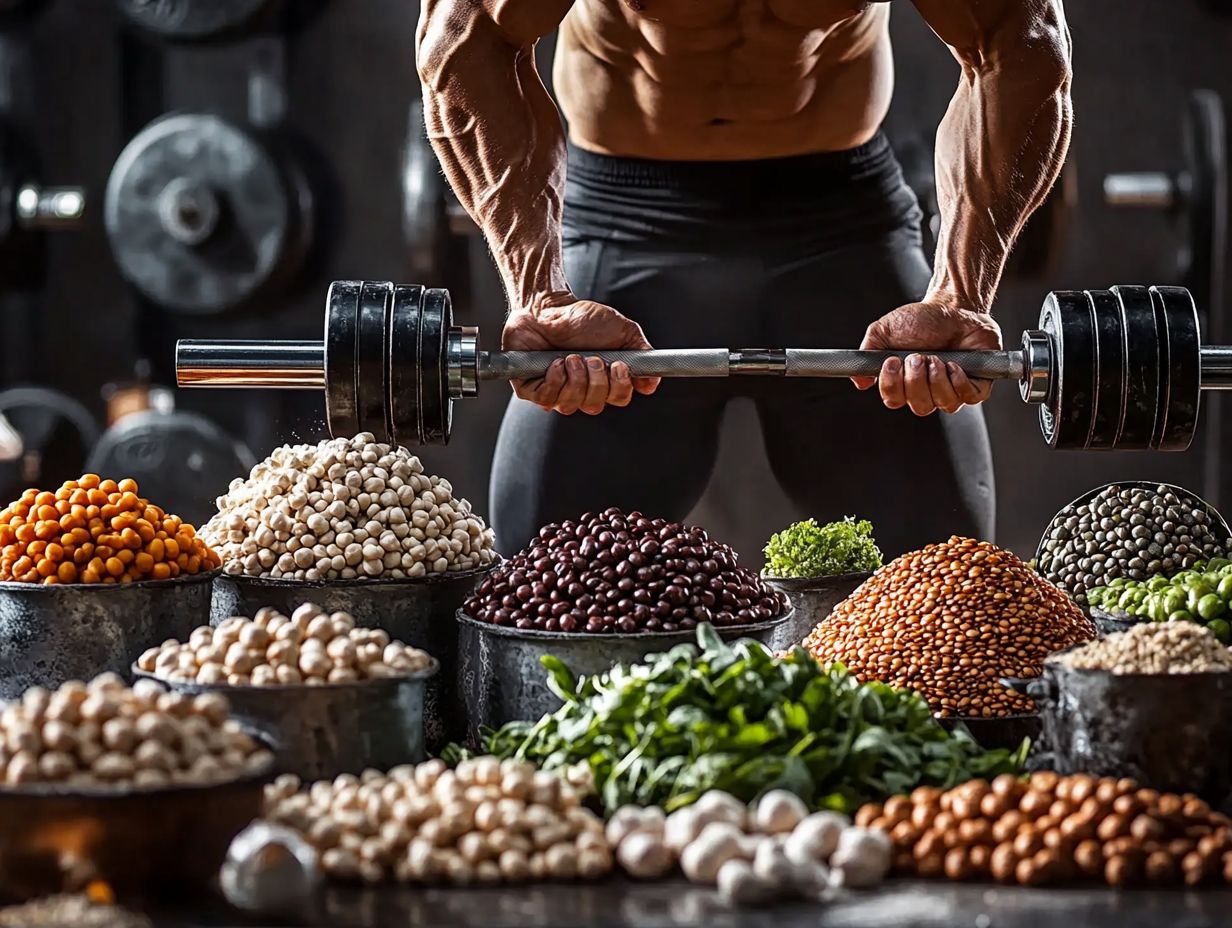
A well-structured sample vegan bodybuilding meal plan is an invaluable resource for individuals aiming to achieve their muscle-building goals while adhering to a vegan diet. Following meal-planning guidelines helps ensure that individuals consume a variety of essential nutrients while avoiding potential deficiencies.
The following meal plan incorporates protein-rich foods in every meal and demonstrates how to balance caloric intake, nutrient density, and essential nutrients throughout the day.
1. Breakfast
A protein-rich breakfast is one of the most important meals of the day for a vegan bodybuilding meal plan. Options like oatmeal topped with nuts and berries or a smoothie made with spinach, banana, and plant-based protein powder provide a substantial source of protein, along with whole grains and fruits that enhance overall nutrient density. Including omega-3s from sources like flaxseed or chia seeds can further support heart health and recovery.
For instance, adding a tablespoon of chia seeds or hemp hearts to overnight oats increases protein content and provides omega-3 fatty acids to aid in recovery. Avocado toast on whole grain bread, topped with nutritional yeast and sliced tomatoes, is another delicious option that adds healthy fats and essential vitamins.
These meals serve as excellent fuel for workouts and recovery, helping you feel great throughout the day and work towards your fitness goals.
2. Snack
These healthy snacks for vegan bodybuilding meal plans offer extra protein and nutrients between meals. Satisfying options such as hummus with carrot sticks, chia seed pudding, and a handful of mixed nuts provide valuable calories and aid in muscle recovery throughout the day.
Protein bars made from either pea or brown rice protein serve as a convenient, on-the-go choice for those looking to boost their protein intake. Edamame seasoned with a sprinkle of sea salt is another excellent source of protein, as well as vitamins and minerals.
For those with a sweet tooth, energy balls made from oats, nut butter, and seeds make a delicious treat that provides sustained energy. Incorporating these healthy alternatives into your daily diet can enhance your nutritional intake and help you meet your daily protein targets, which are essential for muscle building and recovery.
3. Lunch
Lunchtime plays a crucial role in meeting the body’s energy needs and maintaining energy availability throughout the day. A nutritious meal could include a quinoa salad featuring black beans, avocado, and a variety of colorful vegetables. These ingredients are rich in protein and contribute to the overall nutrient density of the meal.
To further enhance the protein content and provide essential micronutrients, ingredients such as lentils, chickpeas, and tempeh can be added. These ingredients are crucial for maintaining a balanced diet and supporting muscle growth.
To consistently achieve dietary goals, meal prepping is an excellent solution. Preparing larger portions of versatile components, such as roasted vegetables, grain salads, or protein-rich dips, simplifies the process of assembling meals during a busy workweek.
By dedicating a few hours each week to plan and prepare meals, individuals can ensure they have a variety of healthy, balanced, and satisfying lunches readily available, making it easier to maintain a healthier lifestyle.
4. Pre-workout Snack
A pre-workout snack is essential for boosting energy levels and enhancing performance, and vegan bodybuilders can greatly benefit from options such as a banana with almond butter or a protein bar made from oats and nuts.
These nutrient-dense snacks provide the necessary fuel for muscle-building workouts without being heavy on the stomach. Choosing the right pre-workout snack can significantly impact overall exercise efficacy.
Lightly toasted whole-grain bread topped with hummus or a smoothie made with fruits and plant-based protein powder are also excellent, easily digestible choices.
Timing is crucial; ideally, these snacks should be consumed 30 to 60 minutes before a workout to maximize energy availability and optimize muscle performance.
By incorporating these versatile snacks into their routine, vegan bodybuilders can maintain sustained energy levels while promoting muscle recovery and growth throughout their training sessions.
5. Post-workout Meal
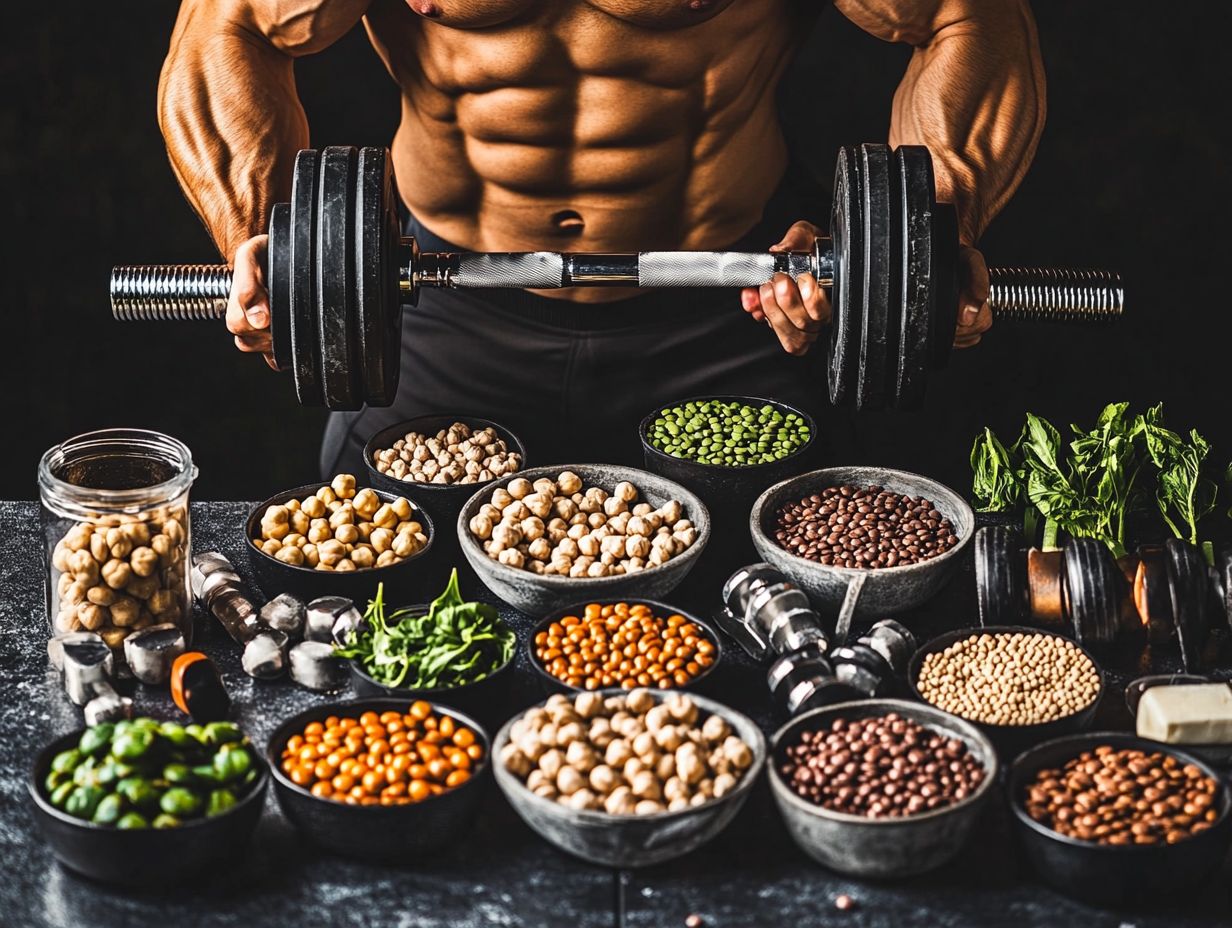
A post-workout meal is crucial for muscle recovery, and vegan bodybuilders should aim to consume protein-rich foods within an hour after exercising.
A protein smoothie made with plant-based protein powder and spinach or a lentil-based meal can effectively replenish energy stores while providing the essential nutrients needed for recovery. Adding supplements like Vitamin B12 and omega-3s can further enhance the recovery process.
Incorporating a wide variety of essential nutrients into these meals can significantly enhance the recovery process. Foods high in carbohydrates, such as quinoa or sweet potatoes, help restore glycogen levels depleted during exercise. Combining these carbohydrates with a healthy protein source, like chickpeas or tofu, aids in the repair and growth of muscles.
A great option for a post-workout meal could be a quinoa salad featuring black beans, avocado, and a lime vinaigrette.
6. Dinner
Dinner, the last meal of the day, offers vegan bodybuilders an opportunity to enjoy a well-balanced meal rich in whole foods. A stir-fry with tofu, vegetables, and brown rice, for example, provides the necessary protein and nutrients for recovery and overall health.
Varying the ingredients each night can make this important meal more enjoyable and delicious. For instance, lentils or chickpeas can be included in a hearty salad with quinoa and an assortment of vibrant vegetables.
At this time, plant-based protein sources can contribute significantly to daily macronutrient requirements, while healthy fats from avocados or nuts can further enhance the meal’s nutritional profile.
For those who are physically active, it is crucial to combine these ingredients in a way that ensures an adequate intake of carbohydrates, proteins, and fats, which can help optimize muscle recovery and growth, while also promoting overall well-being.
Tips for Success on a Vegan Bodybuilding Diet Plan
A successful vegan bodybuilding diet plan relies on adhering to meal-planning guidelines that ensure adequate protein intake and a balance of other essential nutrients.
Vegan athletes need to remain disciplined and proactive in selecting food items that fulfill their protein requirements and other dietary needs. Research from sources like the Journal of the International Society of Sports Nutrition and the Journal of General Internal Medicine can provide valuable insights.
1. Plan and Prepare Meals in Advance
Following a vegan bodybuilding diet plan becomes easier when meal planning and meal prep are incorporated into the routine, as these practices help individuals adhere to their dietary needs. By dedicating time each week to meal preparation, vegan bodybuilders can ensure that protein-rich foods and balanced meals are readily available. This approach supports dietary adherence by providing convenient meals for busy weeknights and reducing the temptation to opt for unhealthy, quick alternatives.
By focusing on cooking larger quantities of lentils, quinoa, and beans—excellent sources of protein—while also preparing a variety of colorful vegetables, one can ensure they receive other essential nutrients. Be mindful of nutrients like Vitamin D and Calcium to maintain bone health and muscle function.
Storing meals in airtight containers and labeling them by day or type helps maintain freshness for a longer duration. Additionally, experimenting with simple recipes, such as salads with chickpeas or stir-fried tofu, ensures that individuals enjoy their meals while meeting their protein goals and minimizing the risk of nutrient deficiencies.
2. Stay Hydrated
Staying hydrated is a crucial aspect of any bodybuilding diet plan, including vegan options, as proper hydration supports muscle recovery and enhances overall performance. Vegan bodybuilders should prioritize adequate water intake throughout the day, especially before and after workouts.
When the body is well-hydrated, it can effectively regulate temperature, lubricate joints, and transport essential nutrients to cells—factors that are vital for maximizing workout efficiency. To maintain optimal hydration levels, individuals should aim to drink water consistently rather than waiting until they feel thirsty.
Incorporating hydrating foods such as cucumbers, watermelon, oranges, and leafy greens into meals can also enhance hydration while providing additional vitamins and minerals. Exploring various fluid sources, such as herbal teas or smoothies, can help maintain interest in adequate water intake, ultimately improving muscle performance and recovery times.
3. Listen to Your Body
Being aware of one’s body is crucial for success on a vegan bodybuilding diet plan. This awareness enables individuals to recognize their energy levels, respond to hunger signals, and understand their recovery needs.
Such information helps vegan bodybuilders tailor their nutrition and training regimens effectively. By being mindful of their bodies, individuals can optimize their dietary choices and ensure they are not missing essential nutrients.
Vigilance is also key to avoiding the side effects of overtraining; recognizing fatigue or soreness in muscles and joints can prompt reductions in workout intensity or extensions of rest periods, thereby facilitating muscle recovery and growth. Additionally, an eating balanced diet rich in essential nutrients like Iron, Zinc, and Calcium can support overall health and performance.
Ultimately, this self-awareness can help individuals avoid burnout and enhance performance, leading to improved and more sustainable bodybuilding results. Supplements such as Vitamin B12 and Vitamin D can also be considered to ensure nutritional adequacy, especially for those following a vegan diet.
4. Find Support and Community
The benefits of a vegan bodybuilding diet plan, which can aid in lowering cholesterol levels, are significantly enhanced by the support and sense of community that comes with it. Staying committed to a vegan bodybuilding diet is easier when there is motivation from others, accountability to peers, and the opportunity to share experiences.
Increasingly, vegan bodybuilders are connecting with one another online through forums and social media groups, as well as meeting locally. This fosters a sense of community and allows individuals to share their knowledge with others. They can exchange tips on meal preparation, workout routines, and nutritional advice, often referencing reputable sources such as the Journal of the International Society of Sports Nutrition and the Journal of General Internal Medicine. Additionally, by sharing experiences and milestones, they encourage one another, which helps everyone maintain their motivation.
If you’re seeking a community to support you in your vegan bodybuilding journey, there are several options available. You can check local listings for vegan fitness clubs or look for local and national events such as bodybuilding competitions or workshops focused on vegan bodybuilding, fitness, and nutrition. Attending such events might also give you the chance to meet influential figures in the movement, including athletes like Arnold Schwarzenegger who advocate for plant-based diets.
Online platforms dedicated to plant-based athleticism, including forums, social media groups, and websites, are also valuable resources. Utilizing hashtags on social media, such as #veganbodybuilding, #veganfitness, and #plantbasedathlete, can help you connect with others and share your journey. These hashtags enable you to celebrate personal achievements and relatable struggles, providing motivation along the way. You can also explore specific dietary supplements and foods like SuperFuel Vegan to enhance your nutrition and performance according to recommendations from the International Society of Sports Nutrition.
